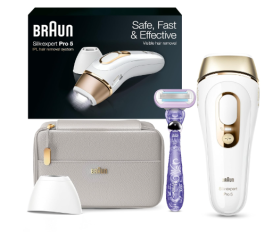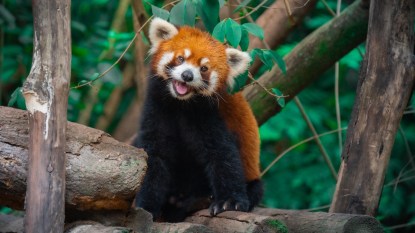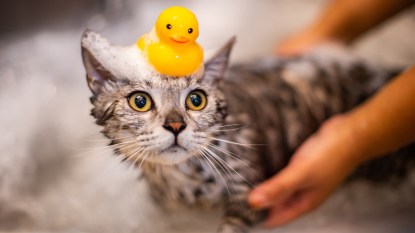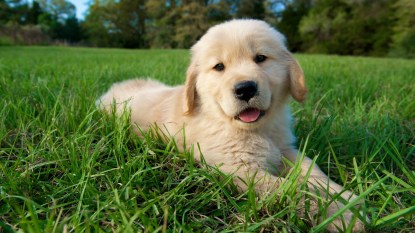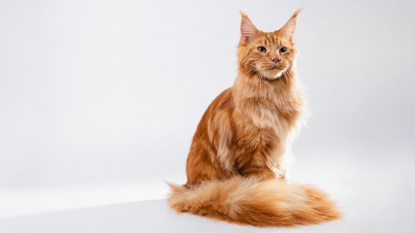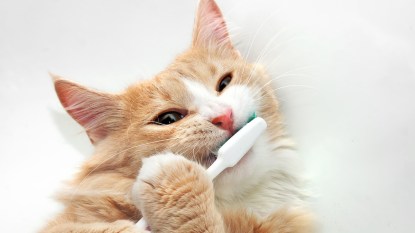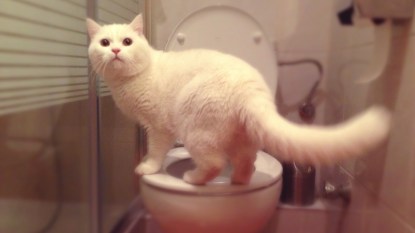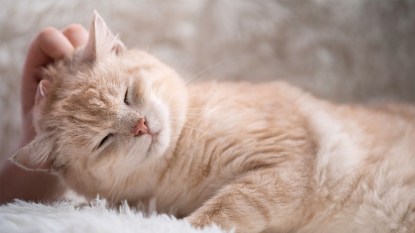Why Cats Chew on Plastic + Expert Explains How To Stop This Pesky Behavior
Here's when you should be concerned.
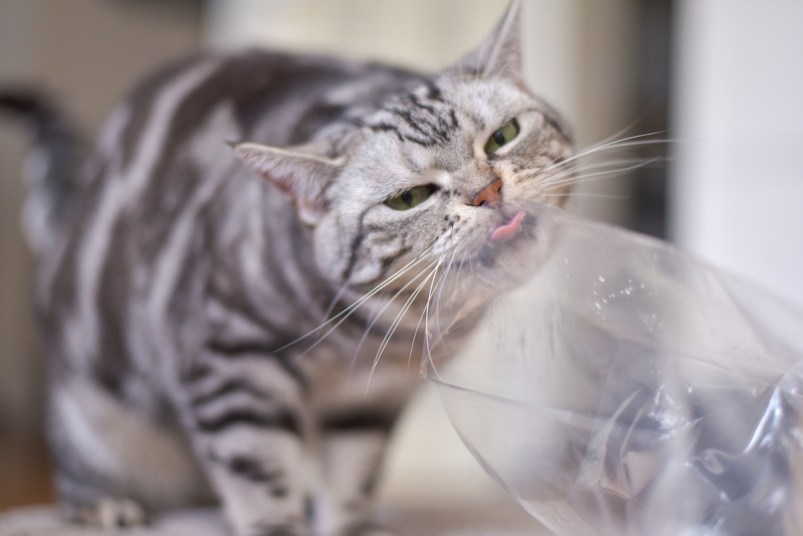
Every cat owner knows that our feline friends often prefer playing with household items and trash to toys. Whether it’s jumping in a cardboard box on the floor or (gulp!) knocking a wine glass off the table, you’ve likely seen your cat play with something that’s decidedly not a toy. Sometimes a kitty’s propensity for playing with random items can become concerning. If you’ve ever found your cat gnawing on a plastic bag or package, you’ve probably wondered how to get them to stop — surely, that plastic doesn’t taste good and it could even pose risks to your precious pet’s health. Read on to find out why do cats chew on plastic and learn how to prevent this behavior with expert-approved tips.
Why do cats chew on plastic?
While you might think otherwise, cats don’t actually chew on plastic just to annoy their owners. The perplexing behavior can actually be a sign of a condition known as pica. Simply put, pica is defined as the ingestion of non-food items.
Stephen Quandt, a certified cat behaviorist in New York City, explains that pica in cats can come from medical issues like nutritional deficiencies, anemia, neurological diseases, gastrointestinal diseases or hyperthyroidism and other endocrine diseases. Additionally, a 2016 study in the Journal of Feline Medicine and Surgery found that cats who were not given as much food were more likely to have pica than those who ate ad libitum (meaning they had access to food at all times).
Quandt warns that ingesting plastic could be dangerous for your cat, leading to constipation and vomiting or even intestinal blockages in severe cases. “If one suspects pica in their cat, a vet visit is highly recommended,” he says. “Early intervention is important in preventing it from becoming a chronic behavior.”
Chewing on plastic and your cat’s mental health
Chewing on plastic is often a sign that your cat is experiencing mental health issues. “Stress and anxiety are considered a significant cause of pica, and the process of chewing and consuming can be a self-soothing experience for cats,” says Quandt, who compares it to an “OCD-like behavior” in which the cat receives “pleasurable feedback” from chewing on the forbidden material.
Related: Why Doesn’t My Cat Purr? Feline Pro on Whether You Should Be Concerned
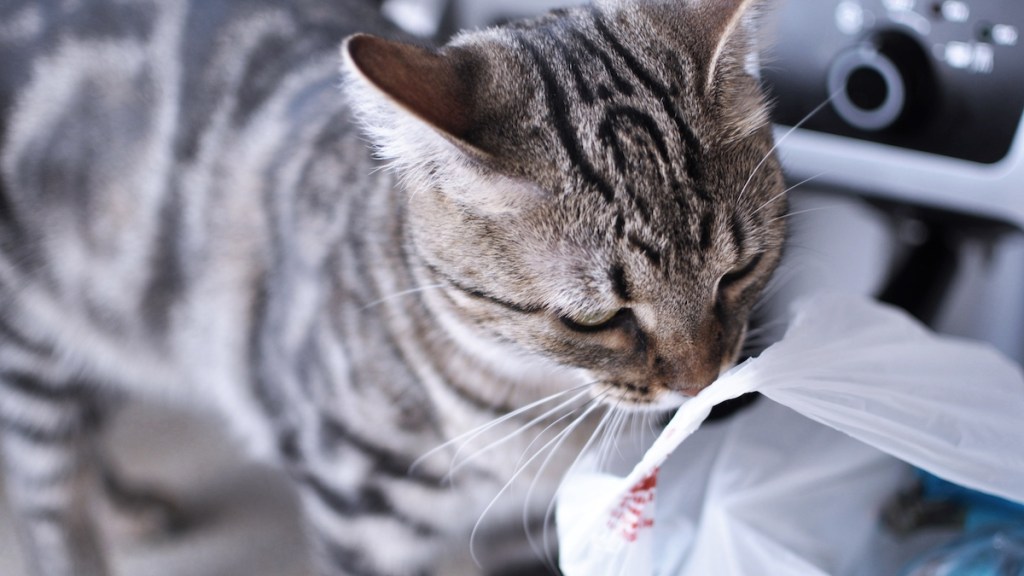
Your cat also might be eating plastic out of boredom, though Quandt cautions that “any primary cause can become secondary if the habit becomes ingrained, even if the primary cause is ‘cured’ and the behavior continues in an OCD-like manner.”
How to stop cats from chewing on plastic
While you’ll want to rule out any underlying medical causes for your cat’s predilection for plastic with your vet, there are also certain techniques you can try to keep your cat away from the material. “Rigorously preventing access to the items in question is the first line of defense,” says Quandt. Cats are often particularly drawn to plastic bags because of their scents (particularly if they carried food) and the crinkling sounds they make when played with, so it’s important to put away these bags where your cat can’t reach them as soon as you bring them into your home.
Related: Why Does My Cat Sniff My Face? Here’s the Reason Behind the Curious Kitty Behavior
If your cat is chewing on plastic out of anxiety or stress, Quandt advises addressing their emotional needs and potentially discussing behavior medications with your vet. If you’re still not sure why your cat keeps chewing on plastic (cats are notoriously mysterious creatures, after all), Quant recommends “addressing boredom with enrichment.” “This is particularly important if the root cause isn’t medical or anxiety-related,” he says.
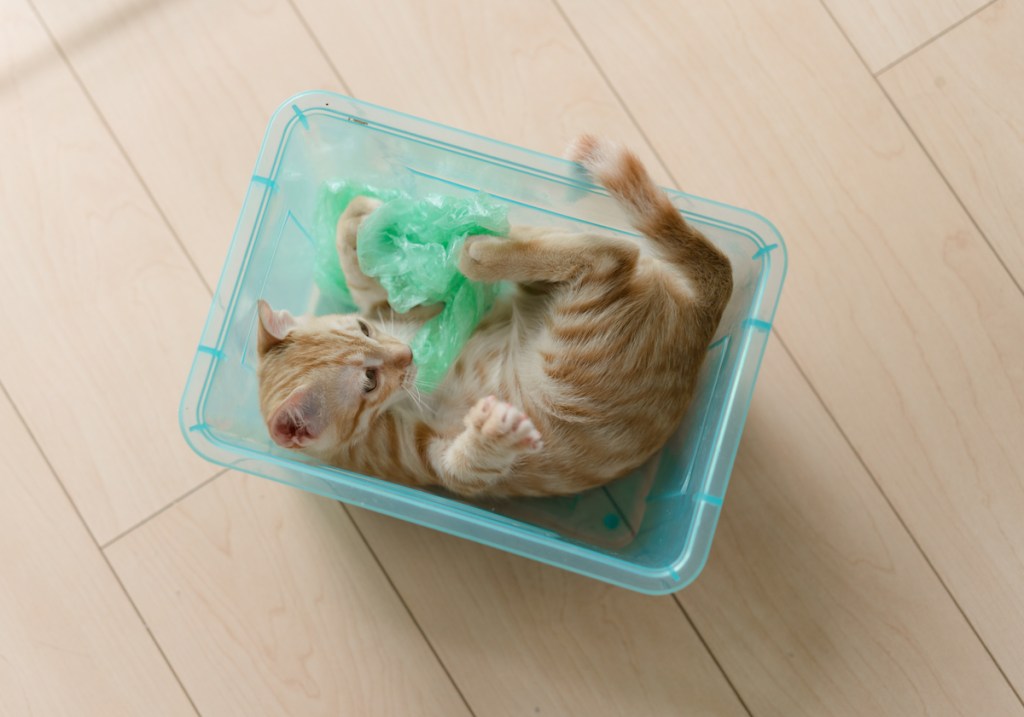
So, how do you keep your cat from becoming bored? Playtime is essential! “Prioritize scheduled play throughout the day,” Quandt encourages. This will help your cat avoid what he calls the “’slot machine effect,’ whereby the cat looks to other sources of satisfaction.” He notes that scheduled play “also creates routine, which is comforting and fights boredom.” And play isn’t just fun and beneficial for your cat, it’s entertaining for owners too. Quandt recommends puzzle toys, chew toys, catnip toys, tunnels and cat trees to keep your cat entertained.
Distracting your cat with toys when you catch them eating plastic is much more effective than yelling at them. In fact, getting angry at them may make them act out even more. Instead, Quandt suggests clicker training or using a bad-tasting spray like bitter apple as potential ways to teach your cat not to eat plastic.
Related: Wondering How to Train a Cat to Use the Toilet? What to Know Before You Ever Start
There are many complex reasons why cats may chew on plastic, and depending on the specifics of the situation the solution can be anything from scheduling a vet visit to simply giving them more toys to play with.
Keep reading for more explanations of confusing cat behaviors:
Why Do Cats Like Boxes So Much? Vets Explain Why Kitties Can’t Resist Cardboard
Why Do Cats Like Shoes So Much? Vets Reveal the Reason for Their Quirky Obsession
Cat Keep Jumping on Your Counters? Vets Share the Tricks to Get Them to Stop — Really

